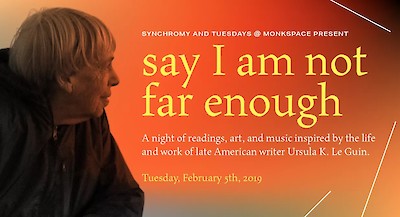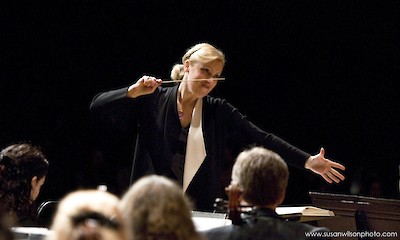Synchromy and Tuesdays at Monkspace "say I am not far enough"
A night of readings, art, and music inspired by the life and work of late Amercian writer Ursula K. Le Guin.
Date and performance times: Tuesday, February 5, 2019 | 6 pm and 8 pm
Location: Monk Space (4414 West 2nd St., Los Angeles, 90004)
Synchromy and Tuesdays @ Monkspace present “say I am not far enough”, a night of readings, art, and music inspired by the life and work of late American novelist Ursula K. Le Guin. Born in Berkeley, California in 1929, Le Guin’s unique voice broke barriers in the realms of science fiction and fantasy in the 1960s and 70s, lending a feminist slant and refreshing approach to genres dominated by macho male protagonists and space battles.
6 pm First Set
Free Show (reservation recommended)
Reservations can be made here
Food and Drink will be available (details to follow)
Elinor Armer’s Lockerbones/Airbones and excerpts from Joseph Schwantner's Wild Angels of the Open Hills, improvisation by Miller Wren, and works by Laura Brackney and Stephen Taylor. Featuring mezzo-sopranos Amy Fogerson and Megan Ihnen, and actors Amielynn Abellera, June Carryl, and Arye Gross. Conductor Stephen Tucker makes his first Synchromy appearance on both programs.
8 pm Second Set
Ticketed as usual by T@MS / Tickets on sale now
Cost: $20 student / $25 adult
More excerpts from Joseph Schwantner’s Wild Angels of the Open Hills with mezzo-soprano Megan Ihnen, flutist Sara Andon, and harpist Ellie Choate. The world premieres of Jason Barabba’s say I am not far enough with Choate and baritone Scott Graff and Australian composer Naima Fine’s A non-euclidean view of California as a cold place to be. Pianist/composer Vicki Ray will improvise with readings of Ursula K. Le Guin’s version of the Tao Te Ching, along with more readings from Abellera, Carryl, and Gross.
Please visit the Tuesdays @ Monk Space website for more details
Notes on the Program by Dr. Richard E. Rodda
Chasing Light ... (2008)
Joseph Schwantner composed Chasing Light... in 2008 as part of the Ford Made in America
a partnership program of the League of American Orchestras and Meet The Composer. He wrote of it, “One
of the special pleasures of living in rural New Hampshire is experiencing the often brilliant and intense
early morning sunrises, reminding one of Thoreau’s words, ‘Morning is when I am awake and there is a
dawn in me’ (Walden). Chasing Light...draws its spirit, energy and inspiration from the celebration of
vibrant colors and light that penetrate the morning mist as it wafts through the trees in the high New
England hills. Like a delicate dance, those images intersected with a brief original poem that helped fire
my musical imagination.
Chasing Light ...
Beneath the sickle moon,
sunrise ignites daybreak’s veil
Calliope’s rainbowed song
cradles heaven’s arc
piercing shadowy pines,
a kaleidoscope blooms
morning’s embrace
confronts the dawn
Each movement’s subtitle is associated with a pair of lines from the poem.
"Sunrise Ignites Daybreak’s Veil " (Con forza, feroce con bravura) opens with an introduction containing
three forceful and diverse ideas presented by full orchestra: (1) a low rhythmic and percussive pedal point
followed by (2) a three-note triplet figure in the brass overlaid by (3) a rapid swirling cascade of arch-like
upper woodwind phrases cast in a stretto-like texture [i.e., close imitative entries]. These primary elements
form the melodic, harmonic and rhythmic materials developed in the work.
“Calliope’s Rainbowed Song" (Lontano [distantly]). The rapid, arched woodwind phrases in the
introduction to the first movement occur in a variety of divergent contexts throughout the work. Cast in an
arch-like palindrome form, this movement begins softly, first with solo clarinet followed by a repeated
piano sonority that forms the structure of a theme played by solo flute. Gradually, this theme builds to an
exuberant midpoint, followed by sections that appear in reverse order, finally ending quietly and gently
with solo clarinet and an ethereal violin harmonic that carries over to the third movement.
“A Kaleidoscope Blooms" (Lacrimoso [tearfully]), a slow, expressive and elegiac movement for
oboe, opens with a low, dark repeated pedal note played by piano, contrabass and gong. Sudden rapid
woodwind gestures contrast and frame a succession of gradually ascending oboe phrases that
accumulate ever-greater urgency as the music approaches its maximum intensity at the end.
“Morning’s Embrace Confronts the Dawn" (Lontano...leggiero [lightly].) The rapid and aggressive
woodwind phrases in the first movement now emerge in delicate and shimmering string textures. These
earlier elements prepare for a stately but urgent chorale theme that builds forcefully to the palindromic
music of the third movement, the introductory materials of the first, and a final climactic conclusion.
Benjamin Zander- Conductor
Program:
BRITTEN
The Young Person’s Guide to the Orchestra
SCHWANTNER
New Morning for the World
HOLST
The Planets
All three of the works on this program display an astounding mastery of the colors and the virtuosity of a modern large orchestra. But of special interest is the second piece, Joseph Schwantner’s New Morning for the World, a gorgeous kaleidoscope of sound, or rather an opulent sonic wave that rolls in from afar and gradually inundates you with its radiance. But there is struggle in those sounds, and defiance as well. And at the heart of it all are spoken words, the words of Dr. Martin Luther King, Jr., taken from his speeches and other writings. Those inspired words pointed towards an uplifting way forward through difficult times when they were first heard during the 1960s, and they have just as much relevance during our time – particularly at this very troubled moment in our history.
In the spirit of equality for all that was at the heart of King’s message we have preceded Schwantner’s work with Benjamin Britten’s A Young Person’s Guide to the Orchestra. A solo for each of the principal players in the orchestra is embedded in this ingenious piece, each one a variation on the theme by Henry Purcell that forms the basis of the work. Ever since Britten composed it in 1945 it has been a favorite work for explaining to children what the different instruments are, and it has been a favorite with audiences for its beauty and variety and its thrilling finale.
And the second half of the program is Holst’s The Planets, which hardly needs an introduction. Some years back it was voted the second most popular piece of classical music – narrowly nudged out of first place by the Beethoven Fifth. Holst used the astrological associations of the planets as a kind of program – or rather pretext – for the work, but the real substance is its range of sounds, the huge spectrum of orchestral timbres and combinations (how often does one get to hear a bass oboe?), from the grandiose to the eerie, culminating in a wordless, almost inaudible women’s chorus way in the distance, as if from the farthest reaches of the solar system
Meditations on Family features new works inspired by memories and tradition. A series of weekly musical meditations commissioned by violinist Yevgeny Kutik, culminating in the release of an EP on March 8.
The Background Violinist Yevgeny Kutik says:
"Almost everything I know about my family’s history and culture I learned by sitting at dining room tables for years on end listening to relatives share stories of what life was like in the USSR. Thanksgiving of 2017 was no different. After hours of collective story-telling, my grandmother Luba shared her memory of dropping my immediate family off at Minsk airport in 1989 to say goodbye and see us off to our new life in the west. During the mass Jewish emigration from the Soviet Union in the 1980s, leaving the USSR meant going into the unknown with few resources and belongings. I decided to put music to family memories and stories.
I asked composers I admire to choose their own family photo, a photo that conjures up memories of joy, sadness, unity, and longing, and to translate that photo into a short work for violin. The result is eight musical meditations, written by eight different voices, each inspired by their own family story and tradition. Here are Meditations on Family."
The Meditations
Starting Friday, January 18, and every Friday through March 8, Marquis and Yevgeny will digitally release a brand new "meditation" commissioned for the album. Each piece was inspired by a personal family photograph chosen by the composer. The recordings were produced by four-time Grammy-winning producer Jesse Lewis. We will release Meditations as an EP on March 8.
Here are the release dates for the recordings. You can hear each piece, see each photograph, and follow along on Yevgeny's new website.
Watch a video from Meditations. This is a beautiful and powerful performance of Joseph Schwantner's "Daydreams…".
The Music
Jan 18: Christopher Cerrone - Flight to Limbo
Jan 25: Gity Razaz - Cadenza for the Once Young
Feb 1: Andreia Pinto-Correia - Litania
Feb 8: Kinan Azmeh - Rima
Feb 15: Gregory Vajda - How to Draw a Tree
Feb 22: Paola Prestini - Suitcased Dreams
Mar 1: Timo Andres - See Above
Mar 8: Joseph Schwantner - Daydreams… https://www.youtube.com/watch?v=A_MfLKJLeIw
Mar 8: Full EP out on Marquis Classics
Here is the first meditation: Listen
Chris Cerrone - Flight to Limbo
"Flight to Limbo" borrows its name from a John Updike poem but is ultimately inspired by a photo of my father as a very small child in Italy in 1947. He had suffered from a terrible case of pneumonia, and being rural farmers during a world war, there was little chance to save this very sick child. His local priest prepared him for death in the pictured ceremonial garments. Luckily, he miraculously survived, recovered, and is still with us today. When composing my violin piece for Yevgeny Kutik, I tried to imagine my father in this moribund state, near death, and barely able to breathe despite enormous effort.
On the March Masterworks concert, the Cambridge Symphony Orchestra takes on Jean Sibelius’ intricate and inspiring Symphony No. 5, written to evoke the beauty and breathlessness of swans in flight.
Joseph Foley, principal trumpet of the Rhode Island Philharmonic, will be the soloist for the tone poem Angels Among Us by Grammy-winning film composer Nan Schwartz.
Finally, Joseph Schwantner’s 1982 New Morning for the World (“Daybreak of Freedom”), narrated by Rev. Dr. Ray Hammond of the Bethel AME Church in Jamaica Plain, pays tribute to the life and legacy of Martin Luther King, Jr.
New Haven Symphony Orchestra
To Thee We Sing
Thursday • April 4 • 7:30 pm
New Haven Symphony Orchestra, The Lyman Center for the Performing Arts, New Haven, CT
The NHSO marks the 80th Anniversary of Marian Anderson’s groundbreaking performance at Lincoln Memorial with a concert that celebrates the perseverance of the human spirit and the ability of music to speak to power. This resonant, poignant performance will use words, art, and music to commemorate and examine what it means to be an American.
Program:
Copland A Lincoln Portrait
Copland Down a Country Lane
Copland John Henry
Copland Letter from Home
Schwantner New Morning for the World (“Daybreak of Freedom”)
Roumain Hip-Hop Essay Part 1- Dance
Traditional My Country Tis of Thee
Traditional Songs from the Underground Railroad
Picker Old and Lost Rivers
William Boughton, conductor
Elliot Forrest, multimedia visual artist
All-City Orchestra
Orquesta Gulbenkian (Gulbenkian Orchestra)
Jose Eduardo Gomes- Conductor
October 3, 2019
The Princeton University Orchestra opens its 2019-20 season with a bang as sophomore Elijah Shina, who won Concerto Competition in his very first year at the university, shows off the virtuosic potential of percussion. The program concludes with Johannes Brahms' final symphony, one of the most revered works in the symphonic repertory.
The program is presented on October 18 & 19, 2019. Tickets: $15 general/$5 students.
To stream the concert live, click here.
Featured Artists- Elijah Shina

Michael Pratt is the conductor of the Princeton University Orchestra and Director of the Program in Music Performance







